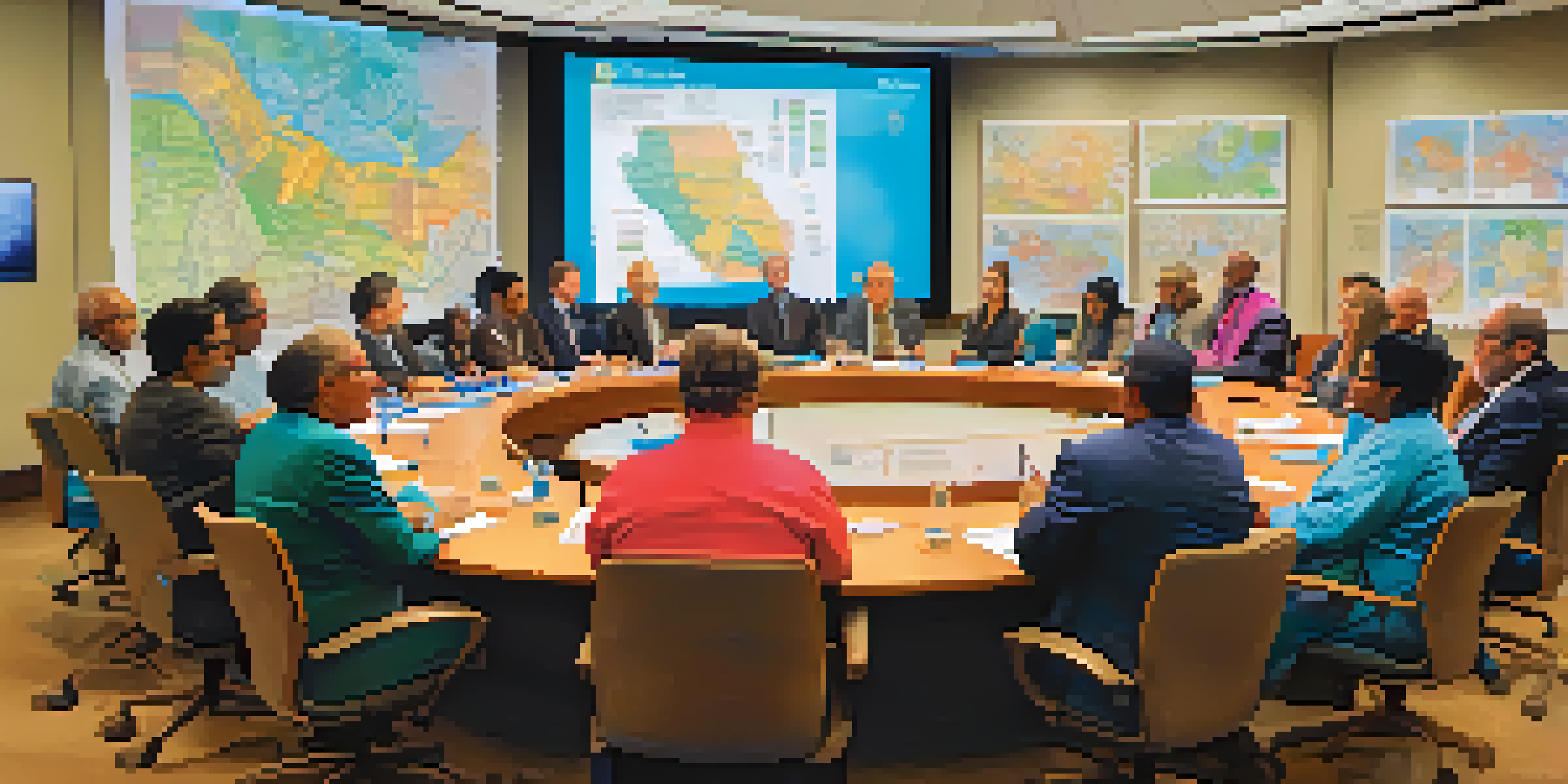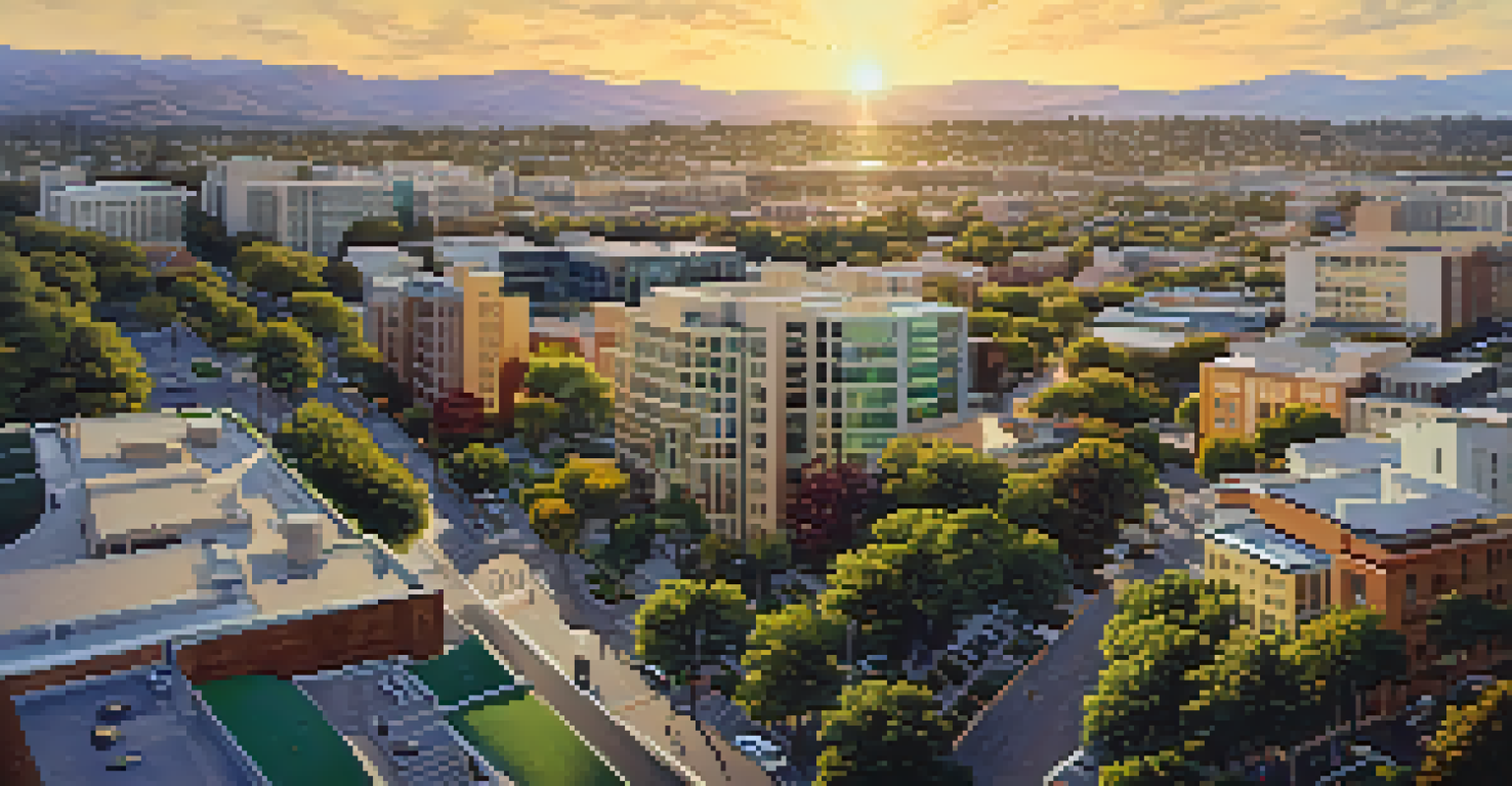Understanding San Jose's Local Government Structure and Roles

An Overview of San Jose's Local Government Framework
San Jose's local government operates within the framework of California's laws, designed to serve its residents effectively. The city is governed by a city charter, which outlines the roles and responsibilities of various government entities. This structure is aimed at promoting transparency, accountability, and service delivery to the community. Understanding this framework is essential for citizens who want to engage with their local government and influence decision-making.
The best way to predict the future is to create it.
At the core of this structure is the city council, which acts as the legislative body responsible for making laws, approving budgets, and representing the interests of the public. The mayor, elected by the residents, serves as the council's leader and plays a critical role in shaping city policies and priorities. Together, they work on issues ranging from public safety to economic development, ensuring that San Jose continues to thrive.
Additionally, various departments and agencies operate under the city's umbrella, each focusing on specific areas such as housing, public works, and parks and recreation. These entities collaborate to implement the policies set forth by the city council and to respond to the needs of the community. Overall, the local government structure in San Jose is designed to be responsive and effective, fostering a strong connection between city officials and residents.
Roles of the Mayor and City Council Members
In San Jose, the mayor holds a significant position, acting as both the ceremonial leader and the primary spokesperson for the city. The mayor's responsibilities include presiding over city council meetings, advocating for the city's interests at regional and state levels, and proposing budgets and policies. This dual role requires a balance between leadership and collaboration, as the mayor must work closely with council members to achieve common goals.

City council members, elected from various districts within San Jose, play a vital role in representing their constituents. Each member is responsible for addressing local issues, attending community events, and responding to residents' concerns. Their input is essential for shaping policies that reflect the diverse needs of San Jose's neighborhoods, ensuring that every voice is heard in the decision-making process.
San Jose's Government Structure
San Jose's local government framework promotes transparency and accountability through a city council, mayor, and various departments dedicated to community service.
Together, the mayor and city council form a dynamic team that drives the city's initiatives forward. They must navigate complex challenges, such as housing affordability and public safety, while also fostering community engagement. By working collaboratively, they aim to create a vibrant and inclusive city that meets the needs of all its residents.
The City Manager's Role in San Jose's Government
The city manager acts as the chief executive officer of San Jose, responsible for the day-to-day operations of the city government. Appointed by the city council, the city manager oversees various departments and implements the policies set by elected officials. This position is crucial for ensuring that the city's resources are utilized efficiently and effectively to serve the community.
Government's first duty is to protect the people, not run their lives.
One of the primary responsibilities of the city manager is to prepare the annual budget, which outlines the city's financial priorities and allocations. This budget reflects the goals set by the city council and provides a roadmap for funding essential services like public safety, parks, and infrastructure maintenance. The city manager also plays a key role in managing personnel, ensuring that the city attracts and retains skilled employees who are dedicated to public service.
Additionally, the city manager serves as a vital link between the council and the public. By facilitating communication and transparency, the city manager helps residents understand government operations and encourages community involvement. This role is fundamental in creating a responsive government that works in tandem with the citizens it serves.
Understanding San Jose's City Departments and Their Functions
San Jose comprises various city departments, each tasked with specific responsibilities crucial to the city's functioning. These departments handle everything from public safety to community services, ensuring that residents have access to essential resources. For instance, the San Jose Police Department focuses on maintaining public safety and crime prevention, while the Department of Transportation manages infrastructure and mobility solutions.
Each department is led by a director who reports to the city manager, ensuring that operations align with city policies and goals. This structure promotes accountability and allows for specialized expertise in different areas of service. Departments often collaborate on projects to address complex issues such as homelessness, environmental sustainability, and economic development, showcasing the city's commitment to integrated service delivery.
Role of the Mayor and Council
The mayor and city council members work collaboratively to represent residents' interests and address local issues like public safety and housing.
For residents, understanding these departments and their functions can lead to more effective civic engagement. Whether attending community meetings or reaching out for assistance, knowing who to contact and what each department does empowers citizens to take an active role in shaping their community. This connection between government departments and residents is essential for fostering a vibrant and participatory local democracy.
The Importance of Local Agencies and Commissions
In addition to city departments, San Jose has various local agencies and commissions that play essential roles in governance. These entities focus on specific issues such as housing, parks, and public art, providing specialized oversight and recommendations to the city council. By involving community members in these agencies, San Jose fosters diverse perspectives in the decision-making process.
Commissions, for example, often consist of volunteers who bring their expertise and passion to the table. They conduct research, hold public hearings, and make recommendations on policies that affect their areas of focus. This grassroots involvement enhances transparency and ensures that the concerns of residents are considered in city planning and policy development.
Moreover, these local agencies serve as a bridge between the city government and the community. They help disseminate information about city initiatives, gather public input, and advocate for residents' needs. By engaging with these commissions, citizens can have a direct impact on the issues that matter most to them, strengthening the connection between the government and the community it serves.
Engaging with San Jose's Local Government
Engaging with San Jose's local government is easier than ever, thanks to various tools and resources available to residents. From attending city council meetings to participating in community events, there are numerous ways for citizens to get involved. The city’s website offers a wealth of information, including meeting schedules, agendas, and contact details for elected officials and city departments.
Social media platforms also play a significant role in fostering engagement, allowing residents to stay informed and voice their opinions on city matters. Many city officials and departments actively use social media to share updates and gather feedback, making it a two-way communication channel. This accessibility encourages community members to participate in discussions and share their views on local issues.
Engaging with Local Government
Residents can actively engage with San Jose's local government through meetings, social media, and public forums, ensuring their voices are heard in decision-making.
Moreover, San Jose hosts various public forums and workshops aimed at educating residents about government processes and initiatives. These events provide opportunities for citizens to ask questions, express concerns, and collaborate on solutions. By actively participating in the local government, residents can help shape policies that impact their lives and contribute to a more vibrant and engaged community.
Challenges Facing San Jose's Local Government
Like many urban areas, San Jose's local government faces several challenges that require innovative solutions. Issues such as housing affordability, transportation infrastructure, and environmental sustainability are top priorities for city officials. As the city continues to grow, balancing development with community needs poses a significant challenge for local leaders.
Budget constraints are another critical issue affecting the city's ability to provide services. With limited resources, the local government must prioritize initiatives that have the most significant impact on residents’ quality of life. This often means making tough decisions about where to allocate funds and how to address competing demands from different departments and communities.

Additionally, fostering community engagement in decision-making can be challenging, especially when residents feel disconnected from government processes. To overcome this, city officials are continually looking for ways to improve communication and outreach. By addressing these challenges head-on, San Jose's local government can work towards creating a more inclusive and responsive environment for all residents.
The Future of San Jose's Local Government
Looking ahead, San Jose's local government is focused on building a sustainable and equitable future for its residents. This involves not only addressing current challenges but also anticipating future needs as the city evolves. Planning for growth, enhancing infrastructure, and investing in public services are essential components of this vision.
Moreover, technology will play a pivotal role in shaping the future of local governance. The city aims to leverage digital tools to enhance communication, streamline processes, and improve service delivery. By embracing innovation, San Jose can create a more efficient and accessible government that meets the needs of a diverse population.
Ultimately, the success of San Jose's local government will depend on active participation from its residents. By fostering a culture of engagement and collaboration, city officials can ensure that the voices of the community are heard in shaping policies and initiatives. Together, they can work towards a brighter future for San Jose, one that reflects the values and aspirations of its vibrant community.